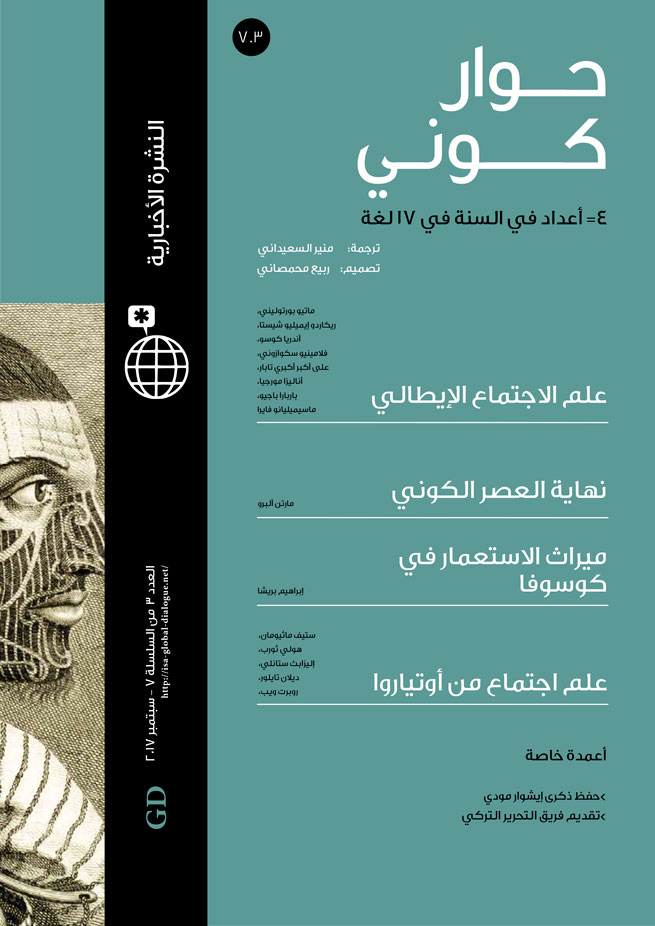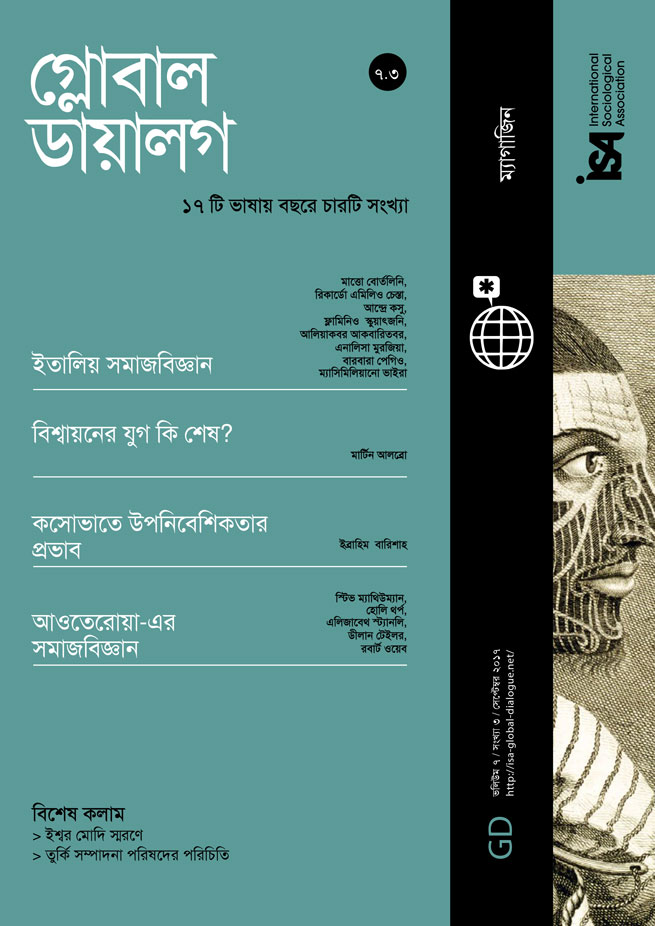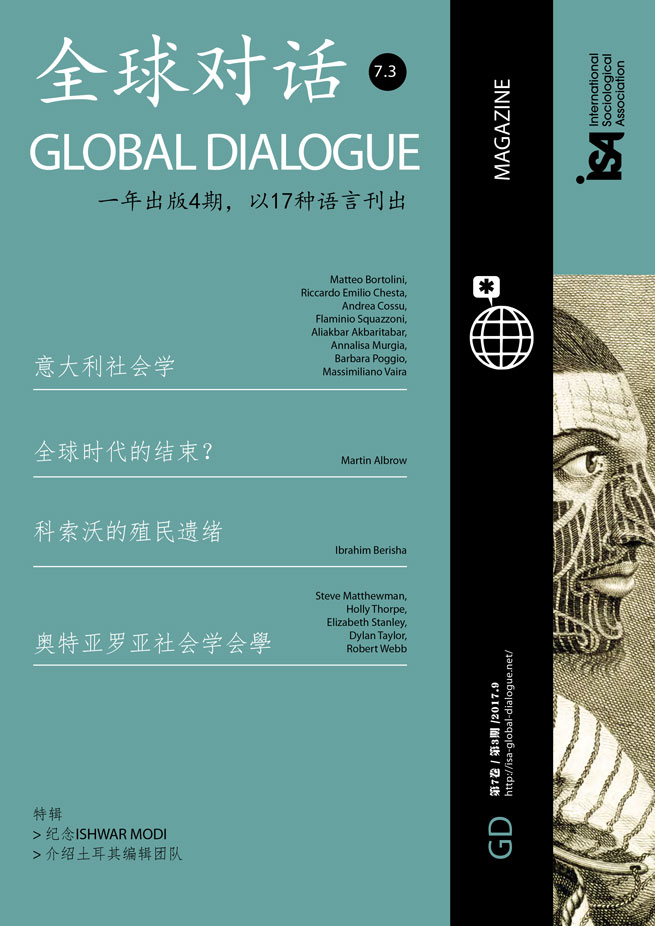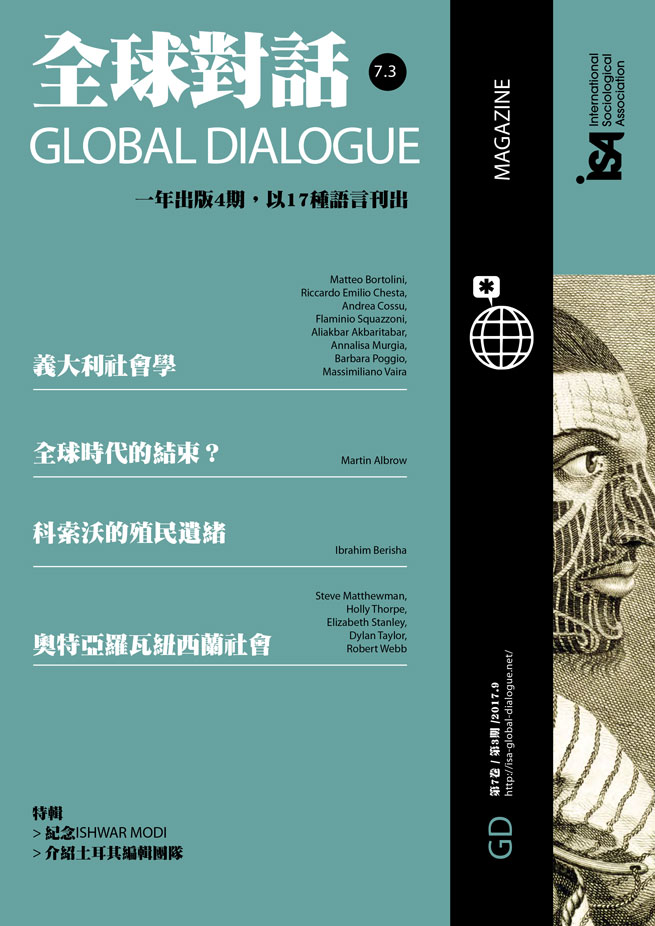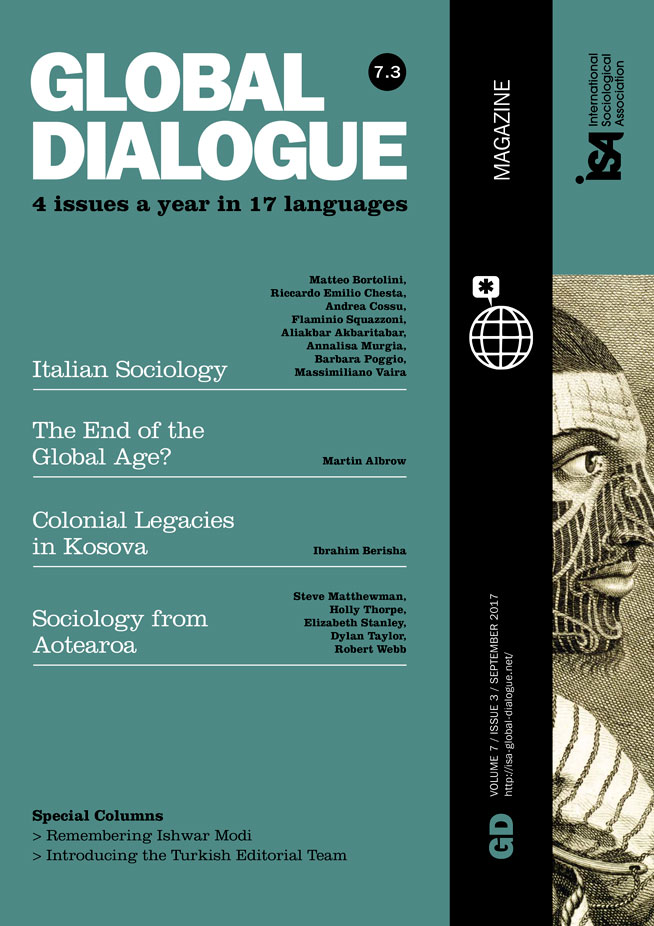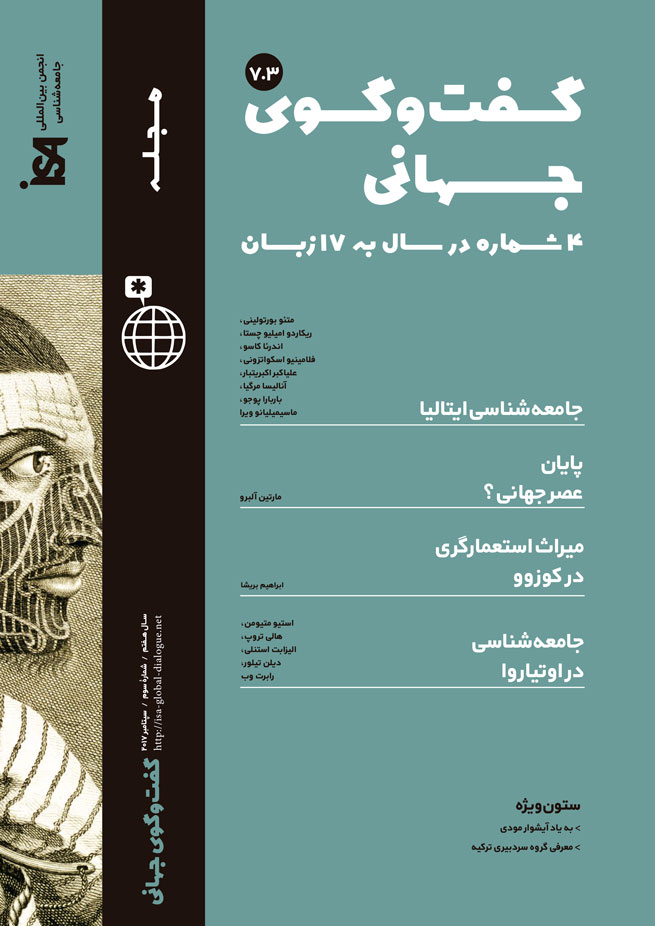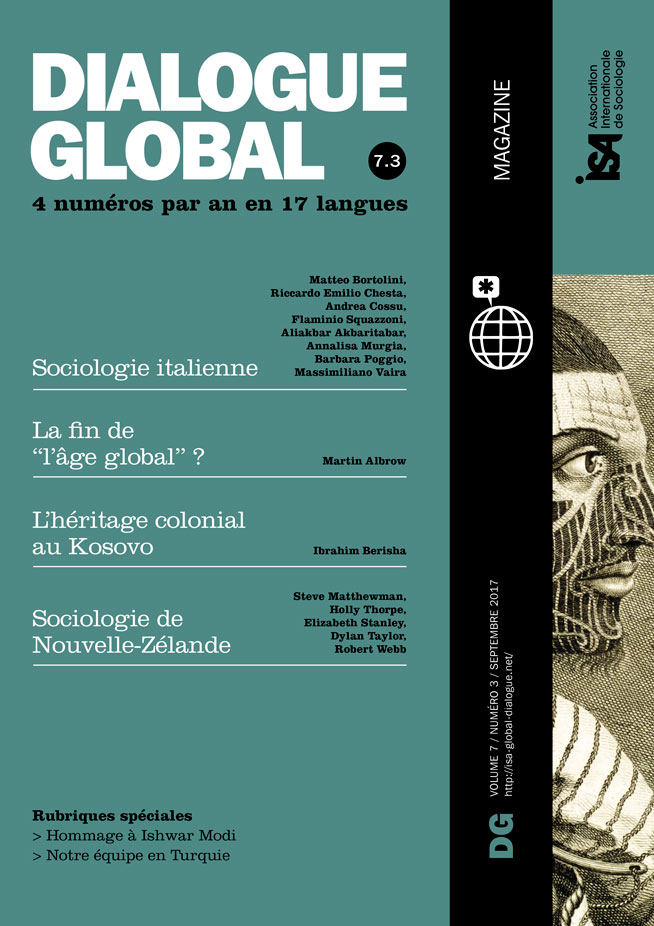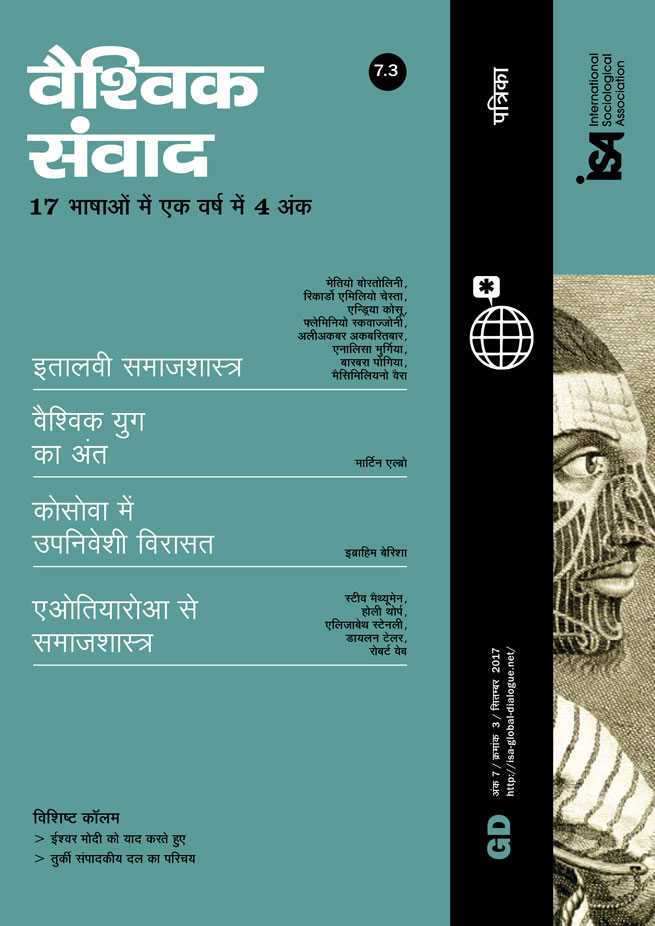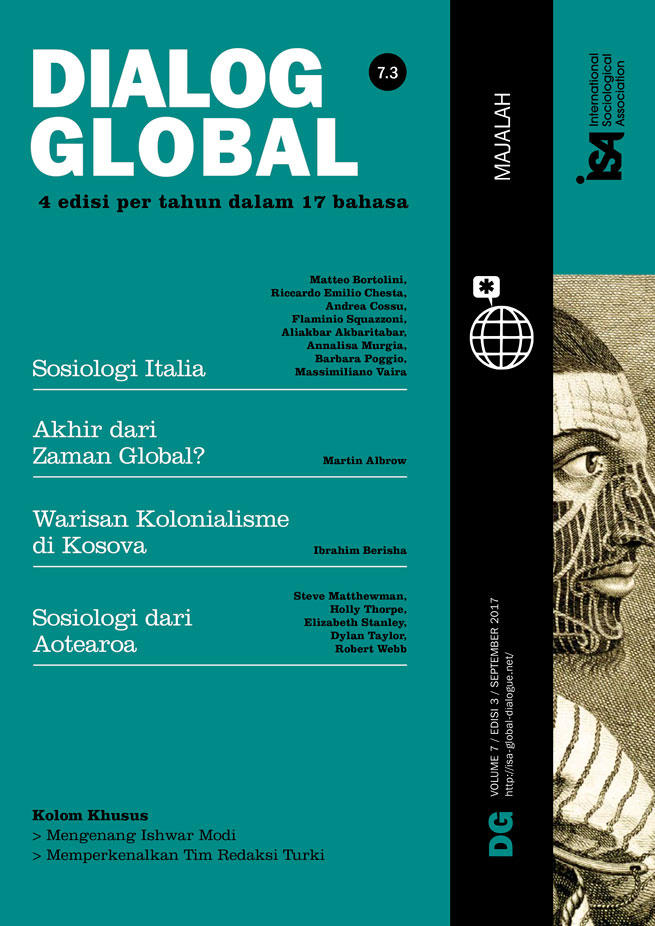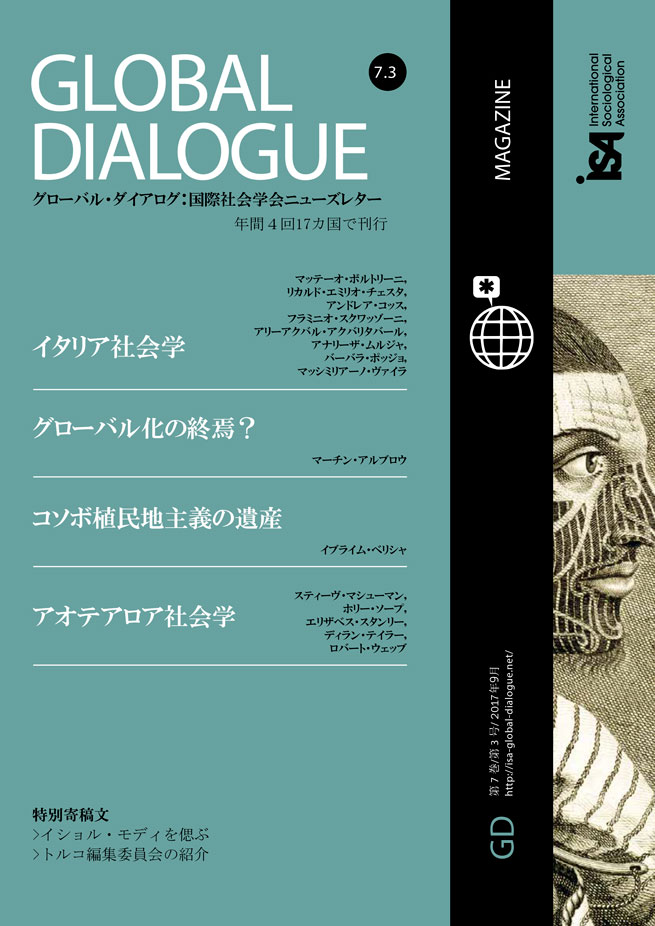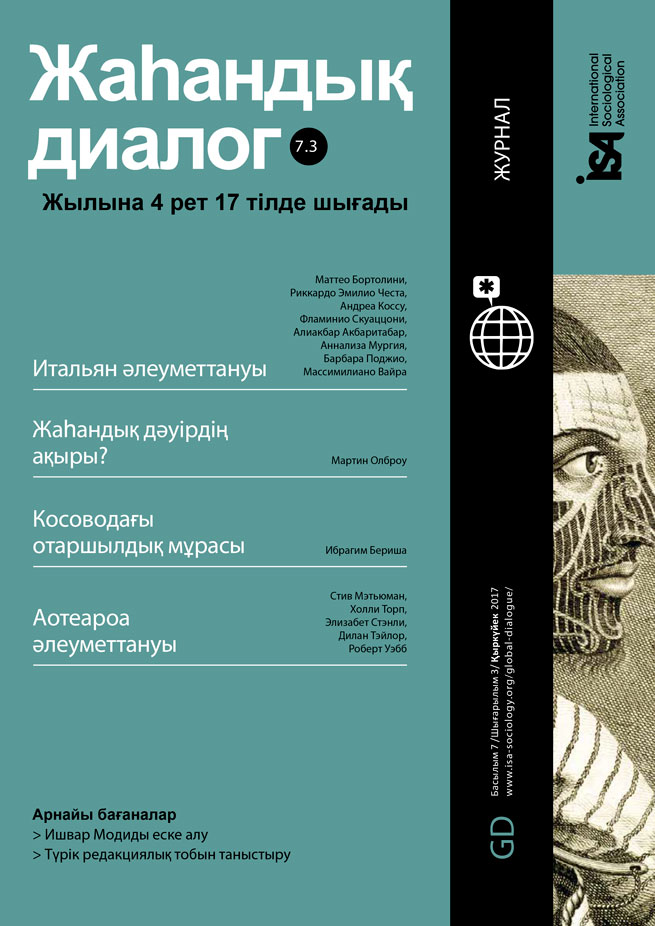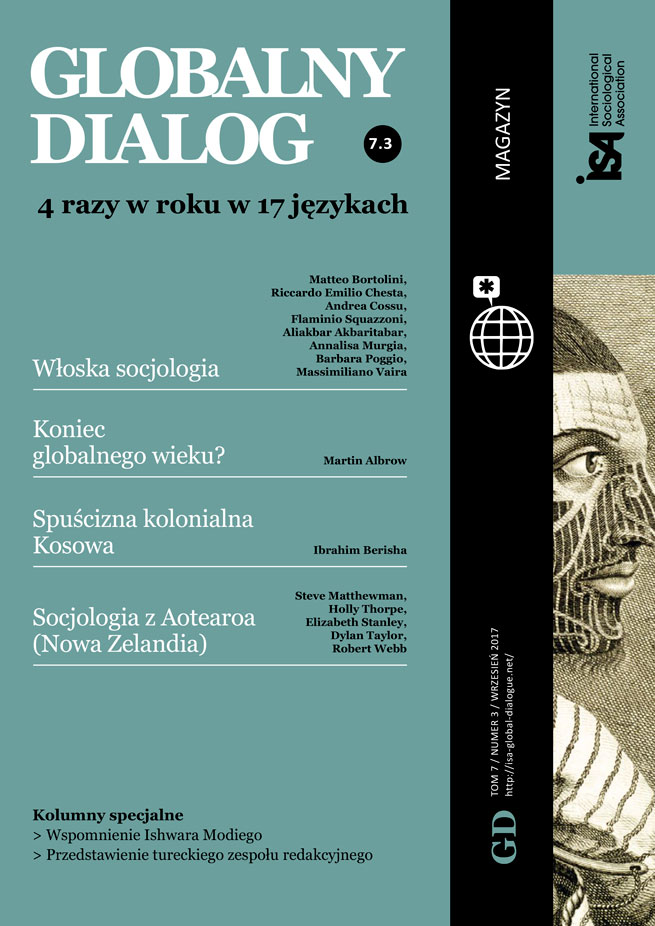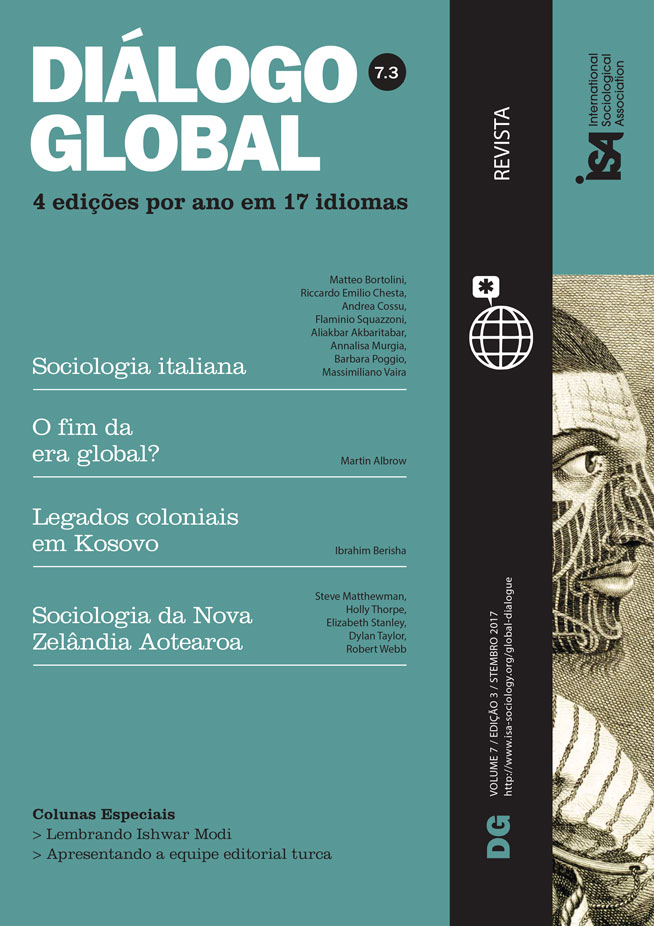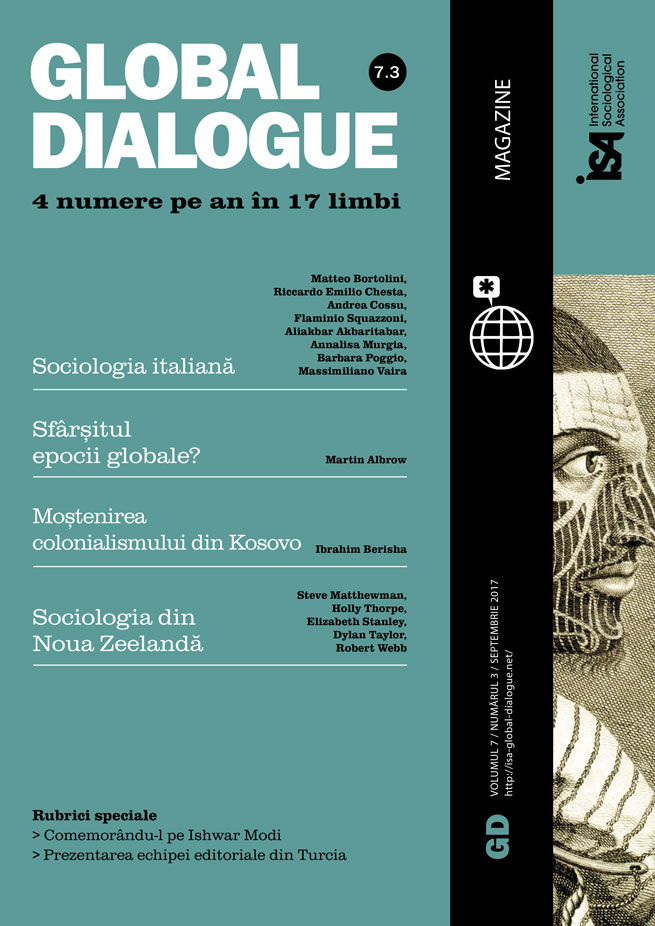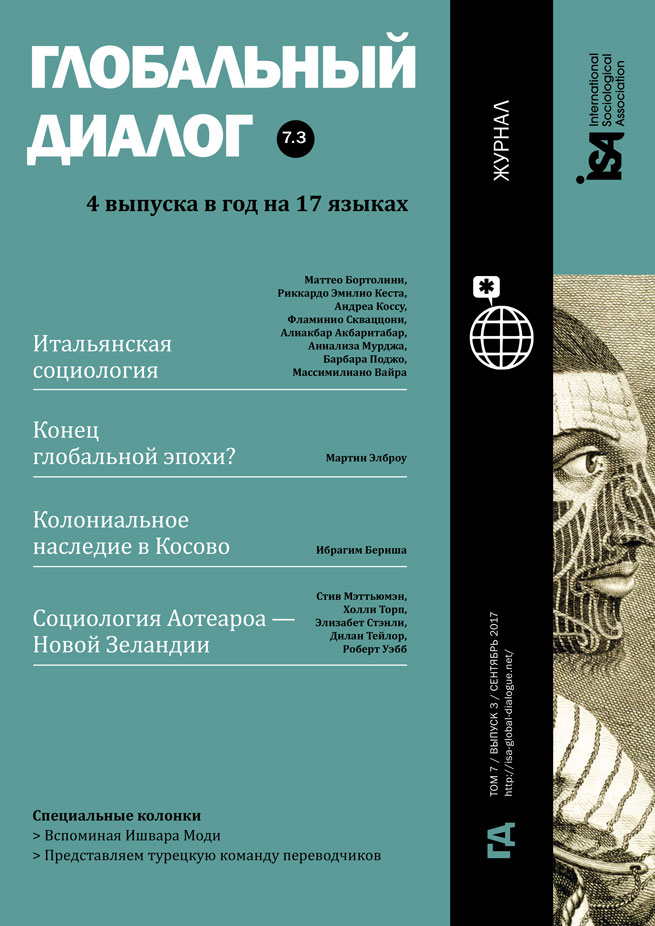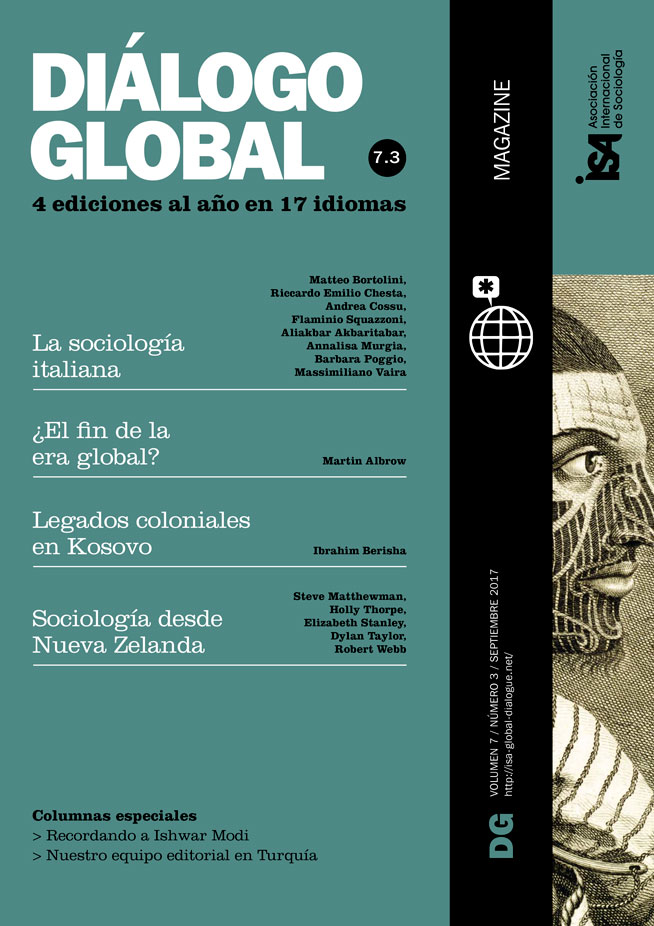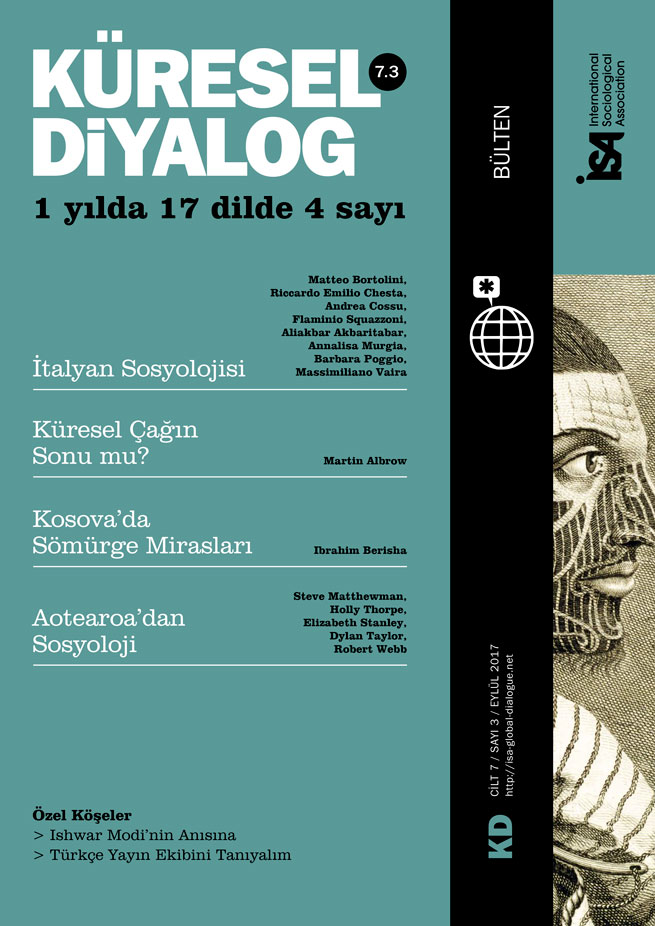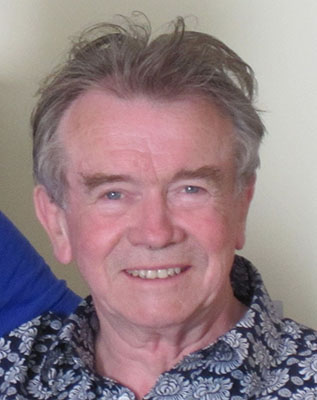Read more about Interviews from around the World

The Legacy of Colonialism in Kosova: An Interview with Ibrahim Berisha
by Ibrahim Berisha and Labinot Kunushevci
August 07, 2017
Martin Albrow, the eminent British sociologist, made an early name for himself as a scholar of Max Weber and author of the widely read monograph Bureaucracy (1970). An early theorist of globalization, he published the pioneering The Global Age: State and Society Beyond Modernity (1996). His other books include Max Weber’s Construction of Social Theory (1990) and Do Organizations Have Feelings? (1997). Early on he apprenticed himself to the great Norbert Elias, and then received his PhD from the University of Cambridge in 1973. He has taught in universities the world over. He was President of the British Sociological Association, 1985-7 and the founding editor of the ISA journal International Sociology (1984-90). He is Professor Emeritus at the University of Wales and a Fellow of the Academy of Social Sciences (UK).
This interview took place on the occasion of a lecture Professor Albrow gave at the Faculty of Sociology and Social Work at the University of Bucharest, Romania, organized by the Social Sciences Division of the Research Institute of the University of Bucharest (ICUB). The interviewers were Raisa-Gabriela Zamfirescu and Diana-Alexandra Dumitrescu, both doctoral students at the Faculty of Sociology of the University of Bucharest.
RGZ: You have been a pioneer in the sociology of globalization. How did this come about?
MA: Well, I suppose globalization was something I came to relatively late. My career began in sociology after I’d done a degree in history. After that I went to the London School of Economics, started sociology there and then started a teaching job in 1961 – I was still at that time working on my dissertation on Max Weber. The dissertation took a very long time because I had teaching responsibilities – and my interests diverged. I eventually decided to concentrate on organizations. My first book was on bureaucracy. It was published in 1970.
RGZ: And eight times reprinted.
MA: Yes, it was extremely successful. I don’t know why, it was just a little book but students found it so useful and that was what I was known for, for many years. I found myself having a typical academic career, becoming a professor – and while I was a professor I then also became President of the British Sociological Association. This was in the 1980s. I became well-known after editing the journal, Sociology, for the British Sociological Association – and then I was invited to edit the journal, International Sociology, for the International Sociological Association. That was a big move for me. It happened in the middle of the 1980s when “globalization” was becoming important. As I rushed to finish my work on Max Weber, I asked myself: “What would Max Weber be doing today, if he were alive?” I thought he’d be working on this new direction of world history. He’d always been interested in the geopolitics as well as working on his intellectual projects; he was also a political figure and I thought he would have been interested in globalization.
So, I finished my book on Weber and in the same year – 1990 – I put together a series of papers with my assistant, Elizabeth King, that became, Globalization, Knowledge and Society: Readings from International Sociology. It was published for the ISA World Congress in Madrid and a copy was distributed to everyone who came to the conference – 4,000 sociologists from all over the world. This launched the word globalization in our discipline.
RGZ: Turning to more recent events concerning regionalism and globalization, after Brexit what do you think of the future of the European Union?
MA: I think one of the problems with the EU in the past has been that it hasn’t developed a strong enough image in the rest of the world. It hasn’t spoken forcefully enough on global issues. It has been too turned in on its own politics. I think that has been a weakness in the past – but of course, it’s extremely difficult for an organization of over twenty countries to fit together and construct something coherent. Extremely difficult.
With Brexit I think you can say that it could have two results for the European Union. On the one hand, it could encourage the EU to become stronger, more integrated, recognize that it does have weaknesses and that it needs to coordinate itself better. In this scenario in its negotiations with Britain it will find a common purpose more easily. I think it’s fair to say that the British government wants the European Union to be strong. It’s in no one’s interest for the Union to be weak. So if all sides agree that it is a win-win situation, if Britain and the EU can agree, the EU will be stronger. That’s one possibility. On the other hand, there is the possibility – and everyone must be afraid of this – that the same forces which led Britain to leave will encourage others in the EU to leave. And there are several countries where, as we know, there are anti-EU, anti-globalization, anti-establishment movements.
RGZ: What about the Schengen policy which lifts border controls on the movement of people within the EU, a principle that has come under attack, especially with the refugee crisis?
MA: When it comes to Schengen I think we learned that there has been a great deal of incompetence on the part of leaders. There has been too much talk of “this is a principle on which we cannot negotiate, we cannot compromise.” Principles are never fully realized, there are always compromises. And the great principle of the EU – the free movement of capital, labor, services, goods – has not been followed to perfection in any of the countries. So, for instance, the free movement of people varies from country to country depending on things like the social security laws or residency. Many towns, even, have their own residential qualifications. This matter of free movement could have been negotiated between Britain and the EU instead of becoming a kind of all-or-nothing principle. Other mistakes have been with regard to the refugee crisis – Merkel should not have said “let everyone come.” It made very little sense in political terms and it encouraged other countries to reject refugees altogether, leading to a great deal of disruption to the sense of belonging to a single community.
DAD: There has been a lot of talk about social media and social movements. What do you think has been the impact of digital communication?
MA: Young people growing up with digitalization might feel all movements are the result – or enabled by – digitalization, but I should remind you that there was a worldwide youth movement back in 1968, long before digitalization. Also, the 1960s were a period of what was called the counterculture, associated with national revolutions and upheavals in universities. The interesting thing about such movements is that they happen spontaneously in different countries. They don’t necessarily require coordination across boundaries because they are responses to similar conditions in similar kinds of countries with similar kinds of development.
Digitalization does make a difference. It does enable spontaneous leadership to emerge and not necessarily the leadership one might expect. Let’s take the anti-globalization movement. The big event focused on the World Trade Organization meeting in Seattle in 1999, nearly twenty years ago. Thousands of people came to Seattle, especially from Canada. President Clinton was due to give a speech at the meeting but eventually had to call it off because of the demonstrations. Conventional media more than social media gave it worldwide coverage. There was no Facebook in 1999. So the effects of digitalization can, I think, be exaggerated. They do intensify communication, of course, and in that sense they increase the speed of response. Politicians understand that, so they now use social media for direct communication; we find the traditional press, newspapers, declining, although television has still a very important role to play because television has a studio so you can bring people together, face to face, even if they come from different countries.
Digitalization has more far-reaching consequences in other fields – in security, surveillance, interception of communications. The knowledge that the authorities get from each other, their secrets and their ability to hack into each other is much more important than simple communication. I know now that any e-mail I send can be intercepted, any of the information we send back and forth – if somebody wants to tap into it, they can.
DAD: From the beginning, sociologists have compared society to a biological organism, continuously metamorphosing. What do you think of this analogy?
MA: Well, we are talking about evolution here. The process of biological change is better understood than the process of social change. This is mainly because I think with social change the processes of inheritance, processes of identity formation, formation of social entities are cultural. One of the great capacities of human culture is that individuals free themselves from the conditions into which they are born, from the social units they belong to. The danger arises from human ingenuity, developing objects of destruction which endanger the rest of humanity – and I’m not thinking just of bombs, I’m also thinking of the invention of biological organisms, of viruses. Quite apart from the relatively slow progress of the technology that could change our biological makeup, the development of robotics of various kinds could make us redundant in many ways. Our ingenuity has created major threats to the human species.
RGZ: The Global Age is probably your most famous book. How do you evaluate it today, especially with regard to your arguments about political dynamics?
MA: The Global Age was written in the mid-1990s so twenty years ago. I was interested in why the new language of the “global” had become so popular. I came to the conclusion that the events of 1945, and then later the events of the 1970s, presented a new recognition of global issues, that is, of challenges to the planet. This is different from globalization, which in its narrow sense is an ideology used by the United States to promote its own interests in the world economy – a very special instance of a global issue. In those post-war years the big issue was the threat of nuclear warfare, the threats to the environment, increasing poverty, pollution of the sea and so on. These were issues that could only be tackled globally. For me that was why the language of the global became so important.
Globalization was an issue that became political in the context of American dominance and especially after 1989 and the collapse of the Soviet Empire. So The Global Age was written really in reaction to all of those who thought globalization was a single unidirectional process. The global age is the age when human beings are under threat collectively. Now, where are we twenty years later? I would suggest that the politics of the global age is crystalizing. The world has divided into two. On the one side, you have the enlightened, the globalized, or the educated who take advantage of a global world, who understand what the challenges are. That’s one set of people and they tend to be the leaders and also the opposition – the dominant political poles in every country. And then, on the other side, you have the rest. And there is an increasing divide between the two.
The politics of the global age have become transnational. So whatever happens in any particular country has to be seen as an aspect of globalized politics. That is I think much clearer to us now. So, ironically, when anyone sees and reads about potential change of power in Netherlands, or what is happening in Ecuador, these changes can only be understood in terms of the relations between elites across the world and their local populations. It’s a global frame. There’s no way to understand political events in one country without reference to what happens elsewhere. That’s my thesis on the global age. I believe it has only been reinforced by what has happened in the last twenty years. In that respect I do think digitalization is making a difference so much so that people may be losing focus on the global and becoming more interested in networks, more interested in connections and relations.
DAD: Looking back on your career, what three subjects do you wish you had studied when you began?
MA: I was brought up in a system that made a radical division between the natural sciences and the humanities, so I dropped natural sciences when I was quite young. I now realize that the intellectual problems of the natural sciences and the social sciences have much more in common than is sometimes understood. I wish I had had a better grasp of some of the fundamental issues concerning the natural sciences, regarding the identification of forces, and the language that we can use to describe them. So my first wish would be to have known more about the sciences.
So to the second wish: even at school, I was fascinated by China and when I went to the London School of Economics I was privileged to attend a seminar given by a very good sinologist and I wrote papers on China. Subsequently, in the 1980s I even visited China. But never, at any point in my career, did I consider learning Chinese. I’m learning it now, but I wish I’d learned Chinese when I was eighteen because it is a fundamentally different kind of language, a different kind of thinking – and such a different outlook on the world would have been a wonderful asset when I was eighteen.
The third wish: I suppose I would have benefited from a broader grasp of religion than the one that I had when I was young. I was brought up in the Church of England and then I was a student and became agnostic. As I got older I realized that the religions of the world hold profound insights. Of course, you have here in Romania one of the most wonderful thinkers on religion, Mircea Eliade. I didn’t read Eliade until I was in my fifties. I should have read him when I was in my twenties.
Martin Albrow <albrowm@hotmail.com>
Raisa-Gabriela Zamfirescu <raisa.zamfirescu@gmail.com>
This issue is not available yet in this language.
Request to be notified when the issue is available in your language.
If you prefer, you can access previous issues available in your language:
